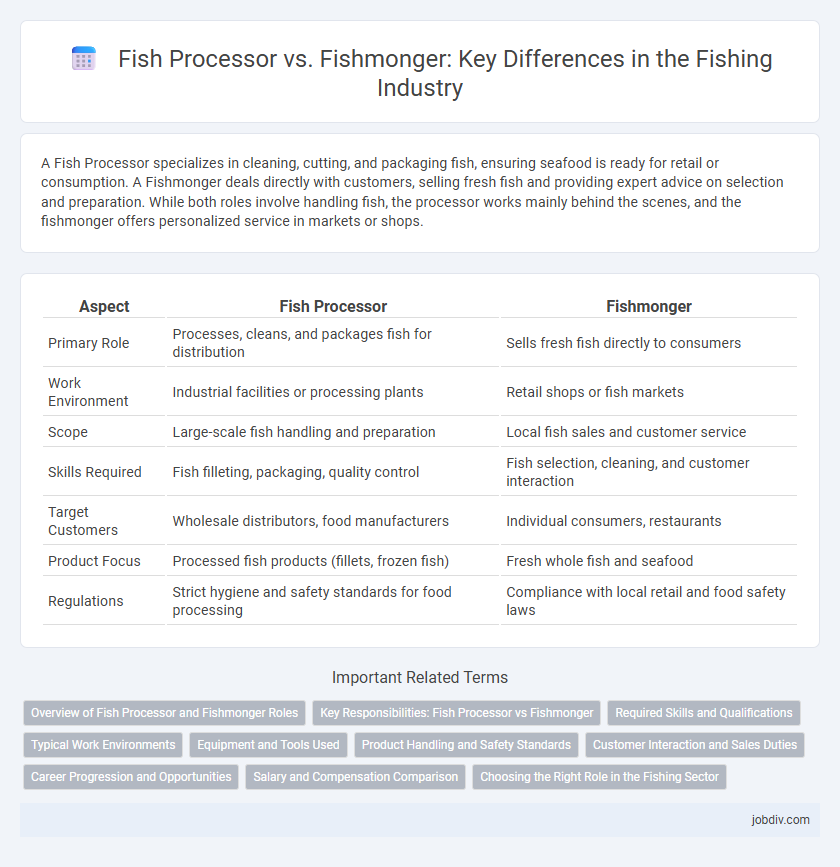A Fish Processor specializes in cleaning, cutting, and packaging fish, ensuring seafood is ready for retail or consumption. A Fishmonger deals directly with customers, selling fresh fish and providing expert advice on selection and preparation. While both roles involve handling fish, the processor works mainly behind the scenes, and the fishmonger offers personalized service in markets or shops.
Table of Comparison
| Aspect | Fish Processor | Fishmonger |
|---|---|---|
| Primary Role | Processes, cleans, and packages fish for distribution | Sells fresh fish directly to consumers |
| Work Environment | Industrial facilities or processing plants | Retail shops or fish markets |
| Scope | Large-scale fish handling and preparation | Local fish sales and customer service |
| Skills Required | Fish filleting, packaging, quality control | Fish selection, cleaning, and customer interaction |
| Target Customers | Wholesale distributors, food manufacturers | Individual consumers, restaurants |
| Product Focus | Processed fish products (fillets, frozen fish) | Fresh whole fish and seafood |
| Regulations | Strict hygiene and safety standards for food processing | Compliance with local retail and food safety laws |
Overview of Fish Processor and Fishmonger Roles
Fish processors specialize in cleaning, filleting, freezing, and packaging fish to prepare them for market distribution, ensuring product quality and safety through strict hygiene standards. Fishmongers focus on the retail aspect, selling fresh fish directly to consumers, offering expertise in selecting, cutting, and advising on seafood products. Both roles are integral to the seafood supply chain, with processors handling post-harvest treatment and fishmongers managing customer interaction and sales.
Key Responsibilities: Fish Processor vs Fishmonger
Fish processors are responsible for cleaning, filleting, freezing, and packaging fish to ensure freshness and safety for consumers. Fishmongers specialize in selecting, cutting, and selling fish directly to customers, providing expertise on types of fish and preparation methods. Both roles require knowledge of fish species, quality control, and hygiene standards, but processors focus more on industrial preparation while fishmongers emphasize customer service and retail presentation.
Required Skills and Qualifications
Fish processors require strong knowledge of food safety regulations, proficiency in operating machinery, and expertise in cleaning and preparing fish for packaging. Fishmongers need excellent customer service skills, deep understanding of various fish species, and the ability to skillfully fillet and display fish to attract buyers. Both roles demand physical stamina and attention to detail but differ in focus, with processors emphasizing technical and hygiene skills and fishmongers prioritizing sales and product presentation.
Typical Work Environments
Fish processors typically work in industrial settings such as seafood processing plants where fish are cleaned, filleted, packaged, and prepared for distribution under strict hygiene standards. Fishmongers usually operate in retail environments like fish markets, grocery stores, or fish stalls, focusing on selling fresh seafood directly to consumers while ensuring product freshness and quality. Both roles require knowledge of seafood handling but differ significantly in their work environments and operational tasks.
Equipment and Tools Used
Fish processors utilize industrial-grade equipment such as automated filleting machines, high-capacity grinders, and vacuum sealers to prepare fish for mass distribution. Fishmongers rely on specialized hand tools like fillet knives, boning knives, and sharpening stones to ensure precision in cutting and presentation for retail customers. Both roles incorporate ice machines and refrigerated display units to maintain optimal freshness and quality.
Product Handling and Safety Standards
Fish processors implement advanced techniques to ensure product safety, including temperature control, hygienic packaging, and thorough inspections to prevent contamination. Fishmongers prioritize fresh product handling by maintaining cold chain integrity and adhering to local sanitary regulations for immediate retail sales. Both roles emphasize compliance with food safety standards such as HACCP to minimize risks of spoilage and ensure consumer health.
Customer Interaction and Sales Duties
Fish processors primarily handle the preparation and preservation of fish products, working behind the scenes with tasks like cleaning, filleting, and packaging to ensure quality and safety. Fishmongers engage directly with customers, providing expert advice, recommending products, and managing sales at retail locations or markets to enhance the purchasing experience. Effective customer interaction by fishmongers boosts sales through personalized service, whereas fish processors focus on maintaining product standards that support successful retail transactions.
Career Progression and Opportunities
Fish processors specialize in preparing and packaging fish products, often working in industrial settings with potential career growth toward supervisory or quality control roles. Fishmongers focus on retail sales, customer service, and product knowledge, with opportunities to advance into management or ownership of fish markets. Both careers offer unique pathways, with fish processors leaning toward production and logistics while fishmongers emphasize sales and customer engagement.
Salary and Compensation Comparison
Fish processors typically earn an average annual salary ranging from $25,000 to $40,000, reflecting entry-level positions in seafood production facilities. Fishmongers, who often work in retail or specialty fish markets, can expect salaries between $30,000 and $45,000, with compensation influenced by sales commissions and customer service skills. Both roles may offer additional benefits such as overtime pay and bonuses depending on the employer and location.
Choosing the Right Role in the Fishing Sector
Choosing between a fish processor and a fishmonger depends on skills and career goals within the fishing sector. Fish processors specialize in handling, cleaning, and packaging fish to maintain quality and extend shelf life, often working in industrial or commercial settings. Fishmongers focus on retail, displaying fresh fish and providing customer service, requiring knowledge of fish types and preparation to meet consumer demands effectively.
Fish Processor vs Fishmonger Infographic

 jobdiv.com
jobdiv.com